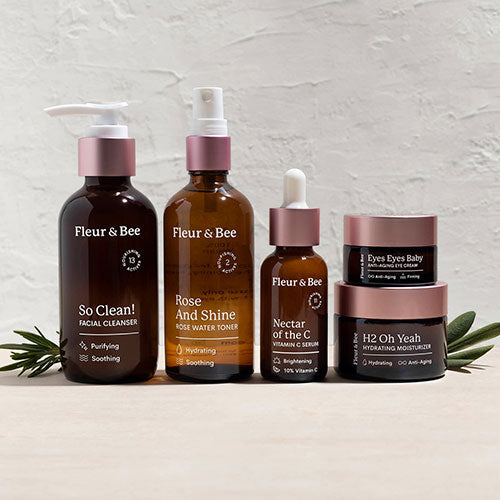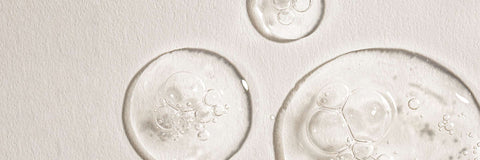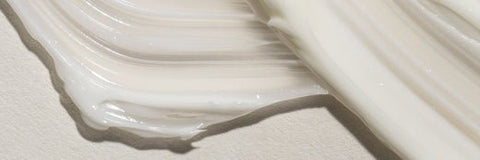It might surprise you to know that many beauty and skincare products contain known toxins that can harm you from the outside in. From industrial chemicals to skin irritants, there are an array of ingredients that should be avoided in skincare, too often found in popular, widely-used products. Clean skincare is more than just a buzzword– it’s a promise that the products you are using on your skin are free from any toxins and potentially harmful ingredients.
To help you know what to look for in a label, we’ll cover the skin care ingredients everybody should steer clear of, those to avoid if you have sensitive or oily skin — and what to opt out of while pregnant. We’ll discuss what the ingredients are, what they’re used for, why they’re bad — and what alternatives to look for.
We put together an informative video detailing all the major ingredients to avoid. Watch it below, or keep reading for more info.
IN A NUTSHELL
Main Takeaways: There are many ingredients in skin care people should avoid, including parabens, sulfates, artificial fragrances, and silicones.
Good to Know: There are only 11 ingredients that are completely banned for use in cosmetics in the US by the FDA, compared to over 1,300 banned chemicals in the EU. Unfortunately, there are ingredients that can be harmful that are still allowed in skin care products in the US, so it’s up to the consumer to read labels.
Recommended Products: All Fleur & Bee products are free from parabens, sulfates, artificial fragrances, and silicones.
Skin Care Ingredients Everybody Should Avoid
Some skin care ingredients are just bad news. They’re derived from industrial chemicals or contain compounds that can irritate, damage or negatively affect skin or overall health.
Considering that our pores absorb approximately 64% of whatever we put on our skin, it’s wise to be proactive about avoiding certain ingredients and opt for safe, clean, botanical options instead.
Skin care chemicals to avoid include:
Parabens
Parabens are synthetic preservatives used to extend the shelf life of beauty products. The bad news is that they’re potentially carcinogenic. Research suggests they may mimic estrogen and disrupt the natural production of hormones.
Alternatives to parabens include sodium benzoate, a natural preservative often used in food products, and potassium sorbate, a safe potassium salt that also prevents mold and bacteria from growing.
Sulfates
Sulfates are synthetic compounds that separate dirt and oil so they can be washed away. They help create the bubbles and lather you find in many cleansers and shampoos. Unfortunately, sulfates can cause skin irritation and exacerbate acne, as well as strip the hair and skin of its natural oils. Natural alternatives to sulfates include palm oil, olive oil and coconut oil.
Phthalates
Known as plasticizers, phthalates are a group of chemicals that make plastic more flexible. They’re used as solvents or binding agents in cosmetic products, allowing other chemicals to dissolve. They’ve been linked to endocrine disruption, developmental and reproductive issues, and cancer.
Silicones
Silicones are synthetic ingredients made up of silicon, oxygen, and often other elements like carbon and hydrogen. They improve the look and texture of products. Unfortunately they can dehydrate your skin, clog pores and negatively affect your complexion. Argan oil is a natural alternative.
Artificial fragrances
This catch-all term can include various chemicals, typically derived from petroleum and processed to create a specific scent — as well as additives that can remain undisclosed on an ingredients list. Generally, they’re used to cover up unpleasant smells or make the product more enticing. Artificial fragrances have been linked to asthma and other respiratory issues, in addition to potentially messing with your hormones and triggering redness, irritation and allergic reactions. Alternatives include natural scents like pink grapefruit peel oil or other botanicals.
Gluten
Gluten is a protein derived from wheat. In cosmetic products, it can help to trap moisture, so it’s used in hydrating products from shampoo to mascara. For those who are gluten intolerant or suffer from celiac disease, gluten can cause issues. Gluten in skin care can lead to skin irritation or other problems. Alternatives to gluten in skin care products include coconut oil and jojoba oil.
Artificial dyes
Like synthetic fragrances, synthetic dyes are often derived from petroleum. It can take up to 25 different chemicals to make just one color. Artificial dyes are used to change the color of products, primarily to appeal to consumers. Dyes have been linked to cancer risks, as well as allergic reactions and hypersensitivity. Alternatives to artificial dyes include botanicals like yellow turmeric or red beets. We prefer opting for products that are natural in color.
Petroleum
Petroleum, or crude oil, is a liquid found beneath the Earth’s crust. While it’s usually refined to become fuel, it can also be used to make many other products. Petroleum is primarily used in skin care as a water-protective barrier designed to make your skin retain moisture. It might be carcinogenic, and it seals off the skin so nothing can get in or out, which can lead to clogged pores. Alternatives to petroleum include coconut oil, shea butter and jojoba oil.

Aluminum
Aluminum is a metal chemical element. It’s widely used in deodorant, blocking the sweat ducts to prevent perspiration. In past studies, it’s been linked to an increase in breast cancer cells, as well as a risk of Alzheimer's. Alternatives to aluminum in deodorant include aloe vera and vegetable glycerin.
Propylene glycol
Propylene glycol comes from propylene, a chemical by-product of the petroleum refining process. It’s used to help ingredients dissolve, stay stable, mix together and retain moisture. Like petroleum, propylene glycol forms a film over your skin, preventing water from escaping. However, it also pulls moisture from the lower layers of your skin to the top layer, leaving the lower layers to dry out over time. Alternatives include glycerin, a liquid made from plant oils.
Polyethylene glycol (PEGs)
Polyethylene glycol is another petroleum-based compound. It’s used in many cosmetic products as thickeners and softeners — as well as in pharmaceuticals as laxatives. Depending on how they’re processed, they may be contaminated with carcinogens that can do damage to the nervous system and potentially interfere with human development.
Formaldehyde
Formaldehyde is a colorless gas, most famous for its use in funeral homes. It can be used in cosmetics through other chemicals known as “formaldehyde-releasers”, so it can be sneaky to spot! As science class taught us, it’s used as a preservative. When inhaled it’s a known carcinogen. It’s also an allergen that triggers skin sensitivity. Alternatives include sodium benzoate and potassium sorbate.
Diethanolamine (DEA)
Diethanolamine (DEA) and DEA compounds are liquid chemicals often used to create foam and bubbles in cosmetic products. It can cause skin and eye irritation, and high doses have also been linked to increased cancer risk.
Triclosan
Triclosan is an antimicrobial, meaning it’s used as an antibacterial and antifungal agent. Frequently found in hand sanitizers, soaps and toothpaste, it’s used to kill germs. Triclosan has been shown to alter hormone regulation and may contribute to the development of antibiotic-resistant germs. It could also be damaging to the immune system and bone density.
EDTA (ethylenediamine tetraacetic acid)
EDTA is an industrial chemical that’s used in many household products. It’s used as a preservative, stabilizer and to enhance foaming. It also makes other chemicals penetrate the skin more easily, so if your product contains other toxins, they’re more likely to be absorbed.
Toluene
Toluene is a chemical that’s often been used in nail polish and hair dye as a solvent, helping other ingredients to dissolve. Toluene has long been considered toxic by scientific leaders. Research shows it may cause developmental damage. It’s also been associated with immune system issues and blood cancer.
Although many of these ingredients are common in the skin care products you find on store shelves, they are completely unnecessary. Building a skincare routine with clean, natural products that are just as effective is really quite simple. There are many options available to consumers, you just need to take some time to check the ingredient label.

Skin Care Ingredients People with Sensitive Skin Should Avoid
If you’re the sensitive type, we’ve got you covered. Try to avoid the following ingredients as much as possible, or at least make sure they’re used in low amounts and show up towards the bottom of the ingredients list:
Alcohol
Alcohol is an organic compound, not to be confused with the kind you drink. Alcohol is used as a preservative, as well as a way to make products feel lighter and go on more smoothly. There are different kinds of alcohol, so pay attention to the names.
Cetearyl alcohol and stearyl alcohol are fatty alcohols derived primarily from plants that have beneficial properties, so don’t worry about these forms of alcohol. Regular alcohol can cause irritation, dryness and other issues in sensitive skin. Instead, look for natural toning ingredients like rose water or aloe vera.
Essential oils
Essential oils are compounds derived from plants. They’re commonly used in skin care as a fragrance. While essential oils have some excellent applications (and smell amazing!), those with sensitive skin may be more likely to have a negative reaction to them.
Chemical sunscreen
Chemical sunscreens use chemical ingredients to create a barrier against the sun’s UV rays. They can easily be absorbed into skin and may disrupt natural hormone production as well as cause allergic reactions. The best and safest alternatives to chemical sunscreens are zinc oxide based sunscreens, which create a physical barrier against UV rays.
Exfoliants
Exfoliants are ingredients that remove dead skin cells from the surface of your skin. Sometimes they’re physical (sugar, salt) and sometimes they’re chemical (glycolic acid, salicylic acid). For people with sensitive skin, over exfoliation can cause irritation or strip skin of its natural oils, so it’s best to use these with caution.

Skin Care Ingredients People with Oily Skin Should Avoid
If your skin tends to over-produce oil, you’ll want to avoid certain ingredients that can exacerbate your issues. Some of the worst skin care ingredients for oily skin include:
Petroleum Jelly
Petroleum jelly (commonly known by its brand name as Vaseline) is a by-product of oil refining. It’s long been used for healing purposes and included in skin care products for its moisture-trapping properties. Because it traps moisture, it also blocks pores and can cause issues for those with a tendency towards oily skin. Alternatives include jojoba oil and squalane.
Lanolin
Lanolin is a type of waxy oil that comes from sheep’s skin. It’s similar to sebum, the oil produced by human skin, and serves to keep sheep’s wool waterproof. While it can provide hydration, it can lead to an overproduction of oil in already oily skin. Alternatives include jojoba oil and squalane.
Alcohol
While it may seem counterintuitive since alcohol is drying, people with oily skin should try and avoid this ingredient also, especially in toners. Remember that cetearyl alcohol and stearyl alcohol are fatty alcohols that are beneficial to the skin, but the term “alcohol’ in an ingredients list is a no-no. Alternatives include botanical ingredients like rose water, aloe vera, and green tea.
Mineral Oil
Similar to petroleum jelly, mineral oil is derived from various minerals — usually petroleum. It’s commonly used in skin care products as a moisturizer. Alternatives include jojoba oil and squalane.
Beeswax
Beeswax is the wax produced by honey bees in a hive. It’s used in skin care to help skin retain moisture and to protect it from environmental stressors. For people with oily skin, however, beeswax can create a barrier that feels heavy and thick, potentially clogging pores. Alternatives include soy wax, carnauba wax and natural oils like jojoba and squalane.

Skin Care Ingredients People with Dry Skin Should Avoid
If your skin tends towards dryness, here are some skin care chemicals to avoid as much as possible:
Alcohol
As we’ve discussed, alcohol has drying properties which can cause issues for those with already dry skin. Cetearyl alcohol and stearyl alcohol are fatty alcohols that are beneficial to the skin and differ from regular alcohol that you might find in an ingredients list. Opt for natural toners that work for all skin types like rose water, aloe vera, and green tea.
Salicylic Acid
Salicylic Acid is a plant hormone that’s typically used to address various skin issues. While it can be extremely effective, there’s a possibility it could lead to dryness, so people who are already prone to dry skin should do their best to avoid it.
Benzoyl Peroxide
Benzoyl Peroxide is an industrial chemical that’s typically used to treat acne. It’s found in face washes, creams and other acne-fighting products. It’s also known to cause dryness and irritation, so those with dry skin should steer clear.
Skin Care Ingredients to Avoid While Pregnant
When you’re pregnant, certain products can be absorbed by your pores, leading to negative effects for your little one. Here are the worst skin care ingredients for pregnant ladies:
Retinoids
Retinoids are a stronger form of Vitamin A, only available by prescription. Retinoid creams are used for a variety of purposes including anti-aging, reducing oil production, unclogging pores, increasing collagen production and treating acne. Retinoids could be harmful to an unborn child and should be avoided by those who are pregnant or planning to get pregnant.
Chemical sunscreen
As mentioned above, these kinds of sunscreens create a physical barrier against the sun’s rays. They can easily be absorbed which can be detrimental when pregnant. Zinc oxide creates a physical barrier against UV rays and is a safe alternative.
Avoid Skin Care Ingredients That Are Harmful
When building a routine that’s good for you and your epidermis long-term, you’ll want to stay away from the worst skin care ingredients like harmful toxins and industrial chemicals.
Instead, opt for natural, botanical, plant-based ingredients that are recognizable and help — rather than harm — your skin. Fleur & Bee offers clean, vegan and cruelty free skincare that is free from all toxins and potentially harmful ingredients.
Looking for an easy skincare routine, from start to finish? We’ve put together our 5-Step Deluxe Set, saving you money while saving your skin from all the nasty ingredients discussed above.





